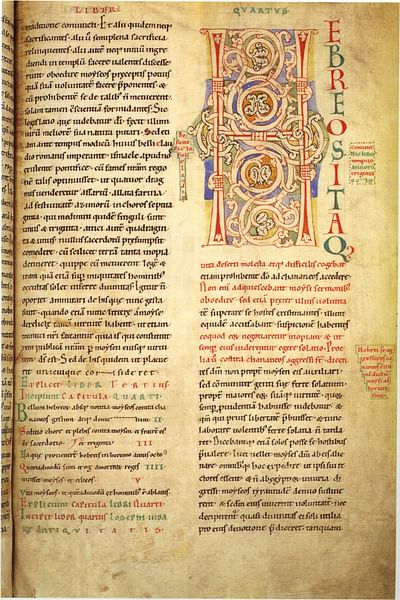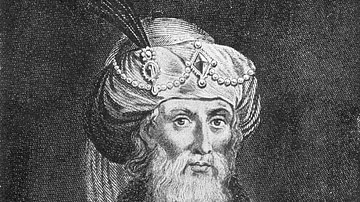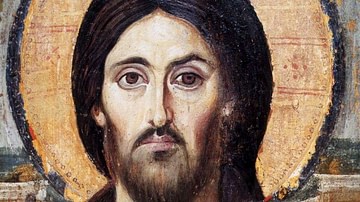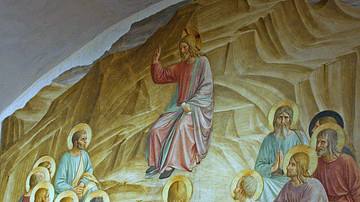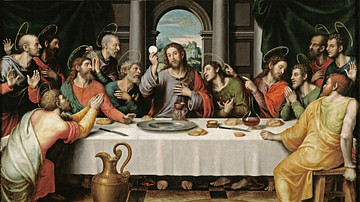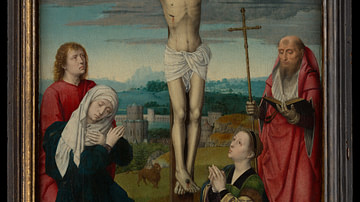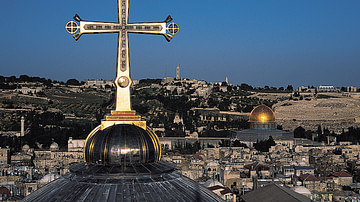Titus Flavius Josephus (36-100 CE), the Jewish historian, is the main source for understanding Second Temple Judaism in the 1st century CE. In the last decades of the 1st century CE, he wrote The Jewish War, the Antiquities of the Jews, Against Apion, and The Life of Flavius Josephus. His histories and eyewitness testimonies remain essential to the study of the historical context that gave rise to the origins of Christianity.
Josephus
Flavius Josephus was born Yosef ben Matityahu, a member of a priestly household in Jerusalem through his father’s side (the house and order of Jehoiarib), and his mother was of royal descent (Hasmonean). He was educated in Jerusalem and most likely shared ideology and sympathy with the party of the Pharisees.
During the Great Jewish Revolt of 66 CE, Josephus was appointed the commander of Galilee. He became famous (and infamous) for changing sides during the siege at Jotapata. He successfully predicted that the Roman commander, Vespasian (r. 69-79 CE), would become the next Roman emperor. Vespasian spared his life, and Josephus spent the rest of the war as a consultant to Vespasian’s son Titus (r. 79-81 CE), who ultimately destroyed Jerusalem and the Temple complex in the year 70 CE. After the war, Josephus moved to Rome where he had access to archives and wrote his histories.
The writings of Josephus are crucially important for several disciplines: Second Temple Judaism in the 1st century CE, background sources for early Christianity, historical details of the client kings of the Roman Empire in the East, and the line of the Julio-Claudian emperors in Rome. Considered one of the greatest traitors by Jews, Christians were the ones who preserved his writings for posterity. This is because he wrote about John the Baptist, reported the death of Jesus’ brother, James, and provided a passage on Jesus himself.
Herod Antipas
A son of Herod the Great (c. 75-4 BCE), Herod Antipas (r. 4 BCE - 39 CE) inherited the region of Galilee (as one of the tetrarchs, the sons of Herod the Great). Josephus described his reign and activities in detail in Antiquities. Antipas was married to the daughter of King Aretas of Petra (the Kingdom of Nabatea in Jordan). However, when meeting the wife of another half-brother, Herodias, he divorced the daughter of Aretas and married her. Aretas then went to war against Herod Antipas who was defeated. In a digression, Josephus added the following:
Now some of the Jews thought that the destruction of Herod's army came from God and was a very just punishment for what he did against John called the baptist [the dipper]. For Herod had him killed, although he was a good man and had urged the Jews to exert themselves to virtue, both as to justice toward one another and reverence towards God and having done so join together in washing. For immersion in water, it was clear to him, could not be used for the forgiveness of sins, but as a sanctification of the body, and only if the soul was already thoroughly purified by right actions. And when others massed about him, for they were very greatly moved by his words, Herod, who feared that such strong influence over the people might carry to a revolt - for they seemed ready to do anything he should advise - believed it much better to move now than later have it raise a rebellion and engage him in actions he would regret. And so John, out of Herod's suspiciousness, was sent in chains to Machaerus, the fort previously mentioned, and there put to death; but it was the opinion of the Jews that out of retribution for John God willed the destruction of the army so as to afflict Herod. (Antiquities 18.5.2)
As a client king of Rome, Herod Antipas had a duty to keep law and order in his province. In this period, various messianic contenders riled up the mobs with anti-Roman speeches. Herod Antipas was afraid that the followers of John in their zealousness would rebel. He would be blamed by Rome for not keeping control.
Scholars often compare Josephus’ report to the one found in the gospel of Mark. Mark claimed that John the Baptist had criticized the second marriage. Herod invited his clients to a birthday party, where he asked Herodias’ daughter, Salome, to dance for his guests. He promised her anything she wanted. Her mother told her to ask for the head of John the Baptist. While debating Josephus’ chronology, nevertheless, the story of the Baptist is considered historical and important from an outsider’s point of view.
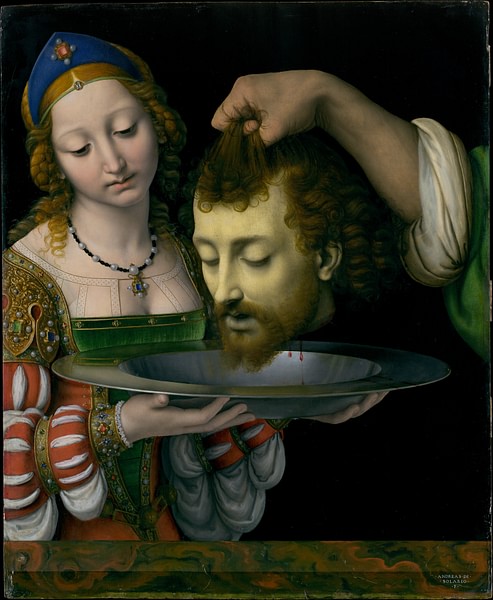
The Death of James, the Brother of Jesus
In describing the rule of the procurator Albinus (62 CE), Josephus included the story of the stoning of James, the brother of Jesus:
And now Caesar, upon hearing the death of Festus, sent Albinus into Judea, as procurator. But the king deprived Joseph of the high priesthood and bestowed the succession to that dignity on the son of Ananus, who was also himself called Ananus ... But this younger Ananus was a bold man in his temper, and very insolent; he was also of the sect of the Sadducees, who are very rigid in judging offenders, above all the rest of the Jews ... Ananus was of this thought he had now a proper opportunity (to exercise his authority). Festus was now dead, and Albinus was but upon the road; so he assembled the Sanhedrin of judges, and brought before them the brother of Jesus, who was called Christ, whose name was James, and some others, and when he had formed an accusation against them as breakers of the law, he delivered them to be stoned. (Antiquities, 20. 9).
Ananus was dismissed as high priest for acting on his own before the next Roman magistrate had arrived. Josephus did not clarify the details of the accusation as "breakers of the law." However, by the 2nd century CE, the story of James was expanded to include details of his piety so that he was then known as James the Just. According to this version, he was thrown down from the pinnacle of the Temple and is considered one of the first Christian martyrs.
The Testimonium Flavianum (Testimony of Flavius Josephus)
One of the most controversial passages is presented as a digression in his description of Pontius Pilate:
About this time there lived Jesus, a wise man, if indeed one ought to call him a man. For he was one who performed surprising deeds and was a teacher of such people as accept the truth gladly. He won over many Jews and many of the Greeks. He was the Christ. And when, upon the accusation of the principal men among us, Pilate had condemned him to a cross, those who had first come to love him did not cease. He appeared to them spending a third day restored to life, for the prophets of God had foretold these things and a thousand other marvels about him. And the tribe of the Christians, so called after him, has still to this day not disappeared. (Antiquities 18.3.)
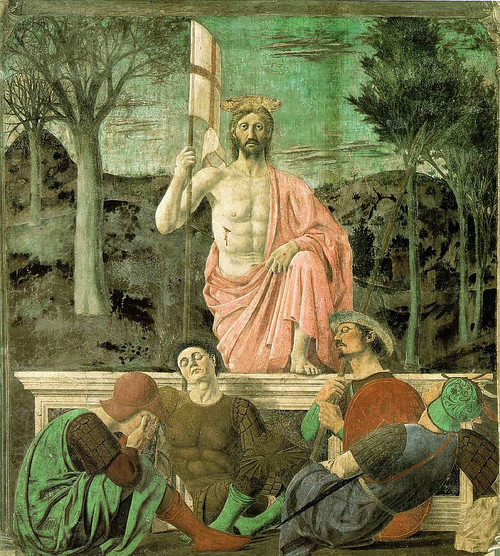
Scholars debate if this passage was originally written by Josephus or added by a later Christian to validate Christian beliefs. It became more famous in the Middle Ages as proof of the story of Jesus, as it demonstrated an objective, outsider’s point of view. The passage is problematic because aside from the mention of Jesus as "the Christ" in the story of James, there is no other reference to the Jesus movement. What is odd is the fact that if Josephus believed that Jesus was the Christ (the messiah of Scripture), there should have been more details and references to the missions of the apostles throughout the empire. But after this passage, he went on to describe more abuses and conflicts under Roman rule. Some modern scholars attempt to recover the original by eliminating the Christological references, turning it into just one more report of a messianic contender.
Because of the above passages, Christians preserved the writings of Josephus, and they remain an important source for the study of early Christianity. In the reconstructions of towns and villages in Judea and Galilee, Josephus is essential for archaeologists as well. There were later traditions that some Christians wanted to grant him sainthood, but this did not materialize.
